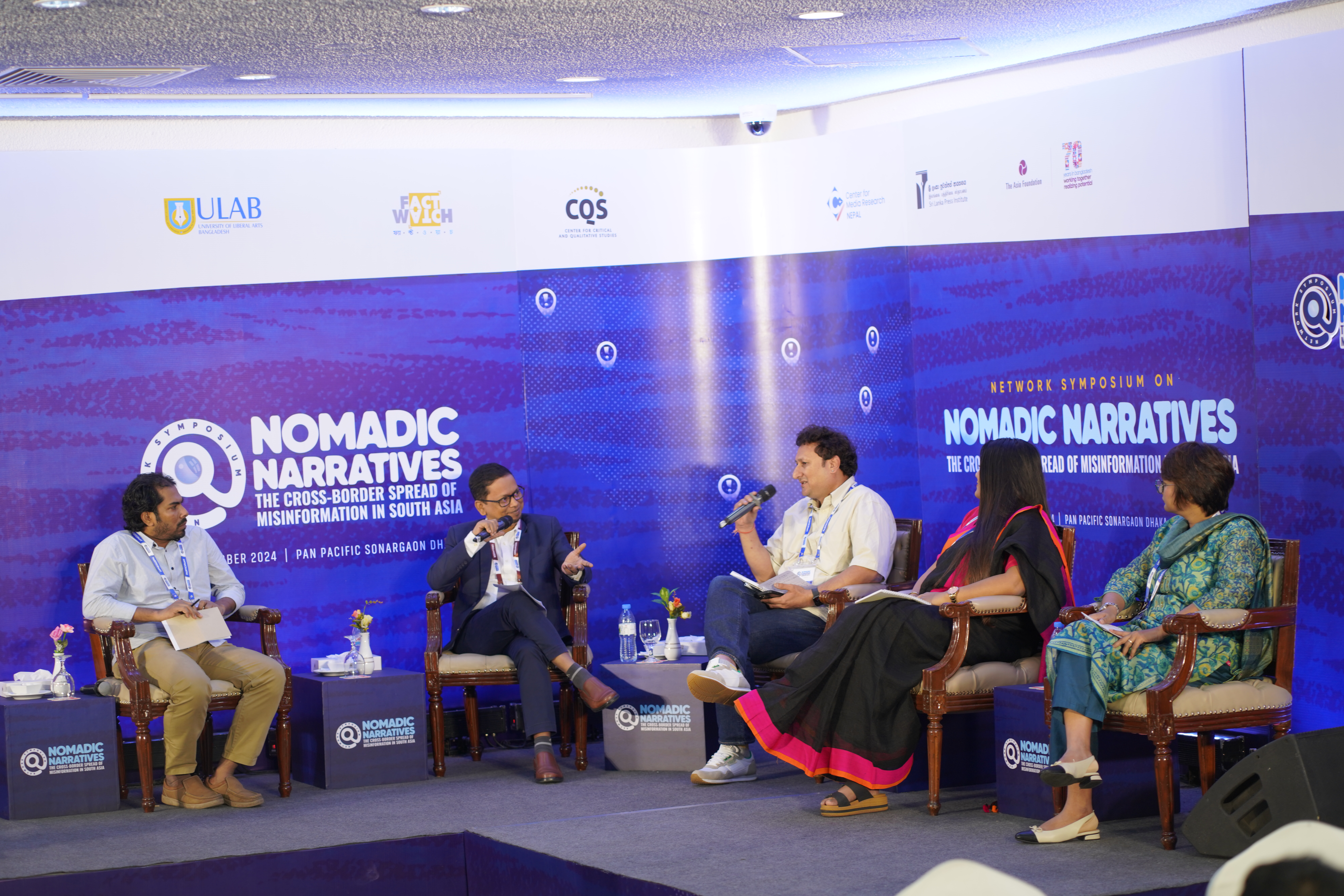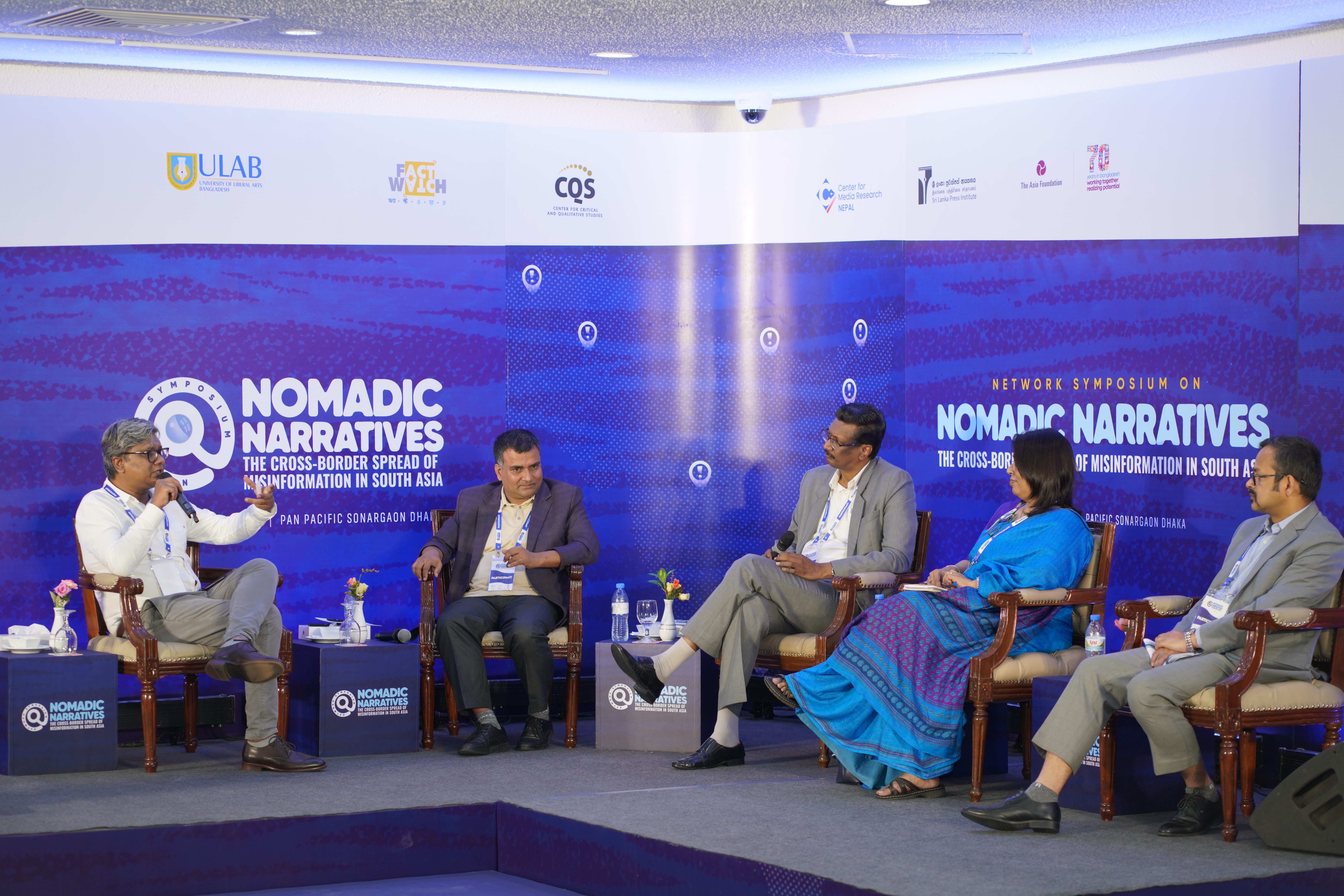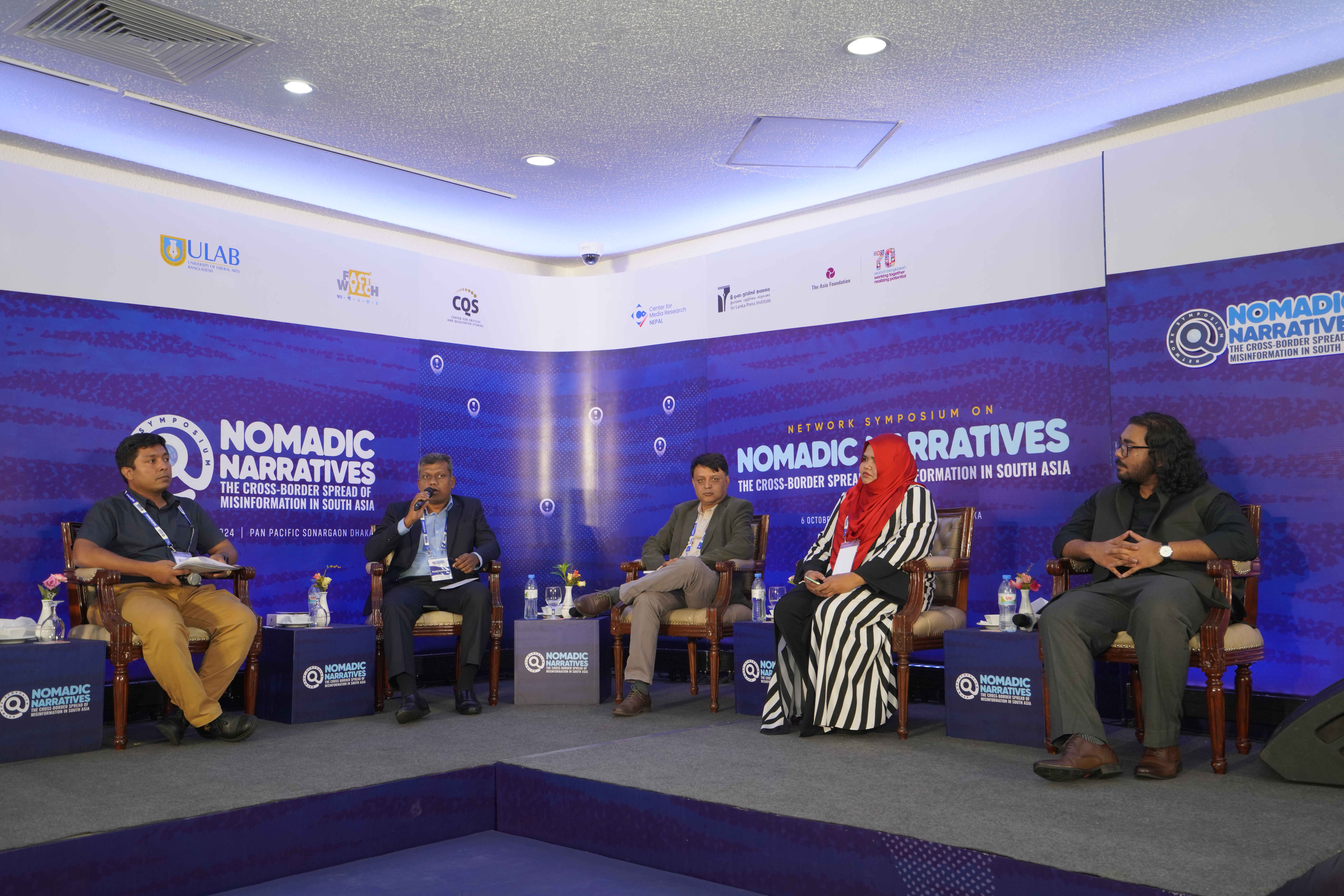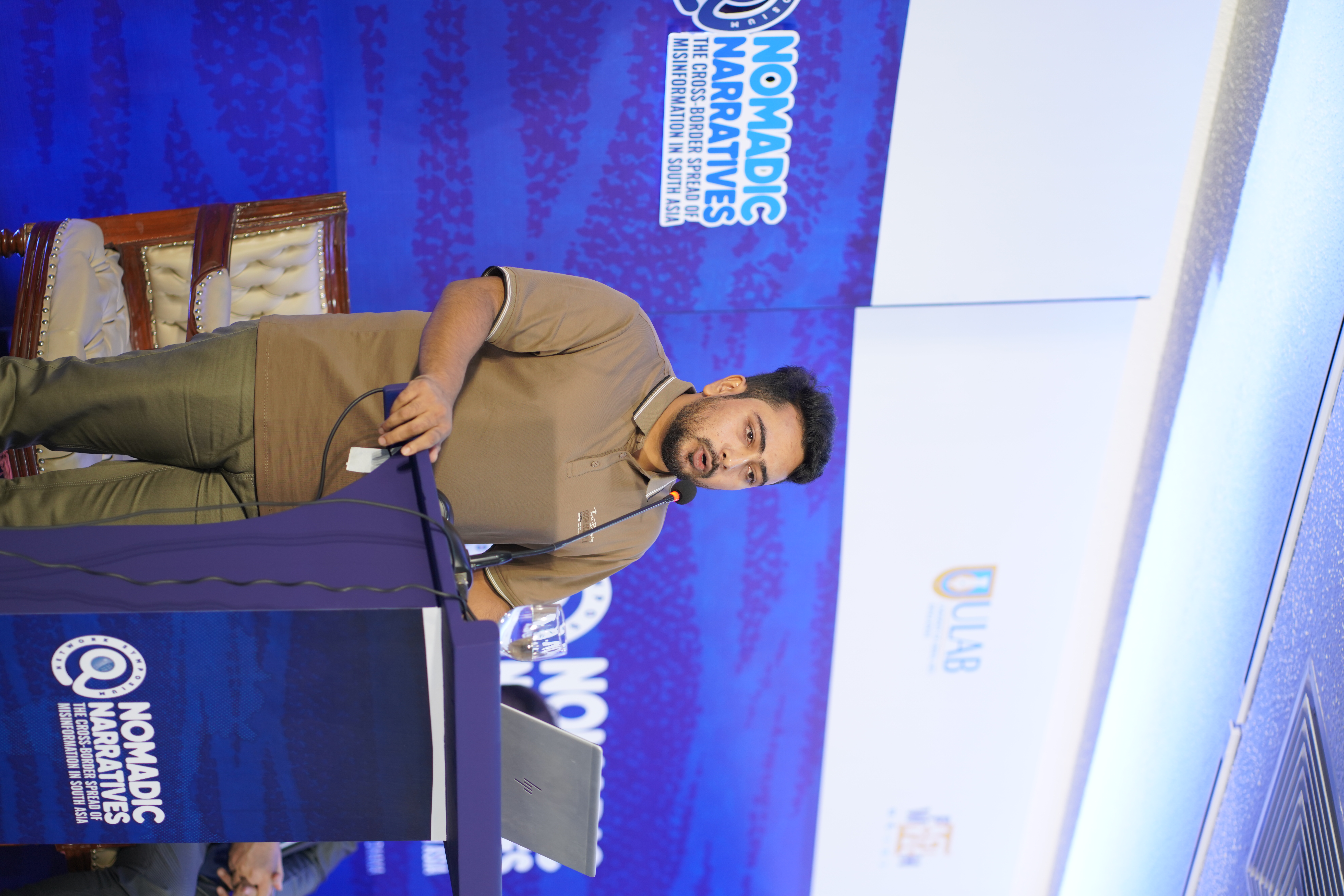Nomadic Narratives: Symposium on cross-border fact-checking urges stronger regional collaboration to combat misinformation
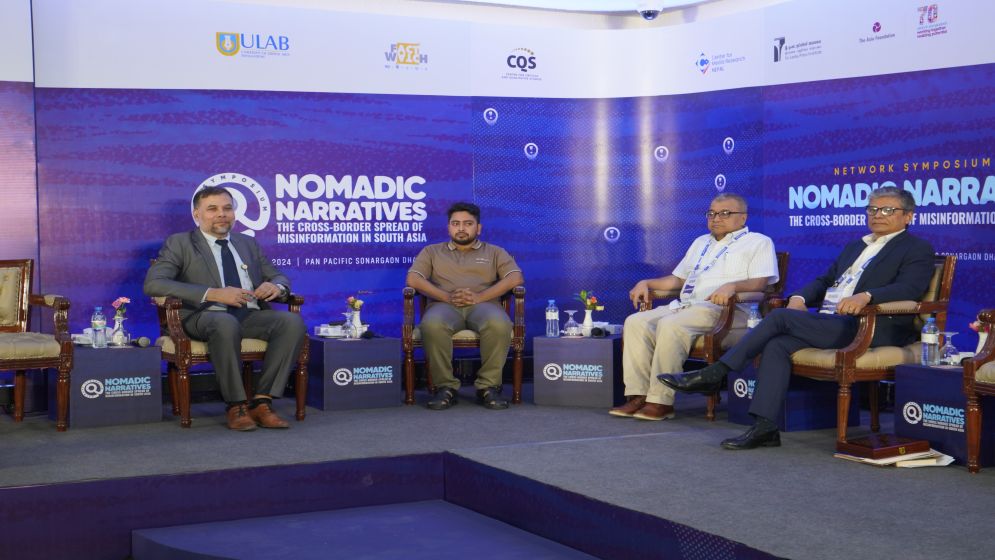
Photos courtesy: ULAB
The University of Liberal Arts Bangladesh (ULAB) hosted a crucial network symposium, "Nomadic Narratives: The Cross-Border Spread of Misinformation in South Asia," on October 6, 2024, at the Pan Pacific Sonargaon in Dhaka.
This symposium is a key component of the ongoing research project, "Countering Misinformation and Hate Speech in South Asia: Towards a South Asian Strategy," led by ULAB's Center for Critical and Qualitative Studies (CQS).
This initiative, conducted in collaboration with CMR-Nepal and SLPI Sri Lanka, is supported by the Asia Foundation (TAF).
The event convened a diverse group of influential scholars, seasoned media professionals from outlets, policymakers, and regional stakeholders.
The symposium featured four core sessions, each delving into specific facets of misinformation and its impact on the region's shared historical and cultural fabric.
Professor Imran Rahman, Vice-Chancellor of ULAB, inaugurated the symposium with a compelling address.
He stressed the urgent need to combat the growing menace of misinformation in South Asia's interconnected digital landscape, calling for collaborative regional strategies and emphasizing the role of media literacy and critical thinking in mitigating its harmful effects.
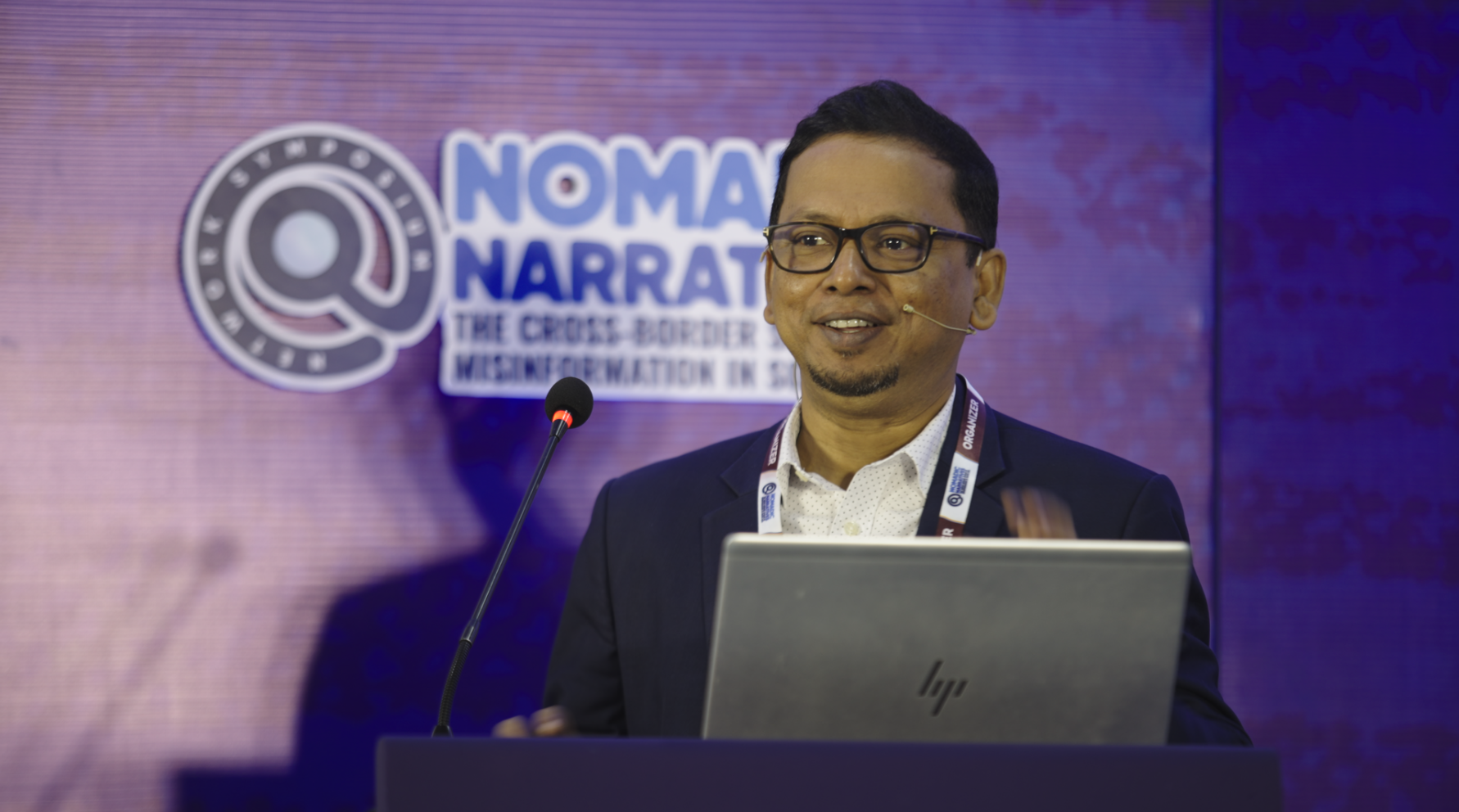
Opening Session: Research findings
During the opening session, Professor Sumon Rahman, Director of the Center for Critical and Qualitative Studies (CQS) at ULAB, and Rahul Roy, a Research Assistant at CQS, presented groundbreaking research on the transnational spread and adaptation of misinformation across South Asian countries.
Their research explored how cultural, social, and political histories shape the dissemination of harmful content, presenting unique challenges for the region. The session emphasized the necessity for critical regional research to effectively tackle information disorders.
Key speakers, including Shafiqul Alam, Press Secretary to Dr. Muhammad Yunus; Kazi Faisal Bin Seraj, Country Representative of the Asia Foundation (TAF); and Shish Haider Chowdhury, Secretary of the Information and Communication Division in the Ministry of Posts, Telecommunications, and Information Technology, commended the thoroughness of the research and emphasized the need for greater regional cooperation to tackle this widespread issue.
Professor Salimullah Khan, Director of the Center for Advanced Technology (CAT) at ULAB, discussed the intersection of misinformation and historical narratives, establishing the session as a cornerstone of the day’s discussions.
In his closing remarks, Md. Nahid Islam, adviser to the Department of Posts and Telecommunications, expressed gratitude for the insightful findings shared during the session.
He emphasized the critical need to understand how misinformation transcends national borders and adapts to diverse social, political, and cultural contexts in South Asia.
Nahid underscored the urgency of confronting the rising threat of misinformation, which increasingly fuels conflicts and undermines regional stability.
He called for a united regional effort to combat these information disorders, urging scholars, policymakers, and media professionals to collaborate in fostering a resilient information ecosystem.
Session 2: Framing the crisis: Indian
media narratives on Bangladesh’s political turmoil
The symposium's second session delved into the intricate dynamics of media representation by examining how recent political unrest in Bangladesh has been perceived and portrayed in Indian media.
Focusing on the manipulation of narratives within Indian news outlets, the session highlighted how historical tensions, along with linguistic, cultural, and religious factors, were often leveraged to shape public opinion.
A distinguished panel featuring Qadaruddin Shishir, Fact Check Editor at AFP, Bangladesh; Swasti Chatterjee, News Editor at Boom FactCheck; and Ruby Dhingra, Managing Editor and Head of Newschecker, dissected the media's role in disseminating biased or false information.
Moderated by Professor Sumon Rahman, Founding Editor at FactWatch, Bangladesh, the discussion explored how misinformation related to Bangladesh's political crisis has been weaponized to strain India-Bangladesh relations.
The panelists exposed strategies employed by malicious actors to propagate falsehoods and analyzed how these narratives skewed public perception in both countries, with potential long-term implications for diplomatic ties.
This session provided a critical examination of the forces at play in shaping cross-border narratives, emphasizing the urgent need for media literacy and responsible reporting to foster greater understanding and cooperation between India and Bangladesh.
Sessions 3: Regional Partnerships for
Advancing Digital Literacy
The symposium shifted its focus to solutions in the afternoon, beginning with a dynamic session on regional partnerships and their crucial role in advancing digital literacy.
Representatives from key development agencies, including Sheela Tasneem Haq, Senior Governance Specialist at UNDP, and MD Zakaria, Program Director at the Asia Foundation, highlighted how international organizations can facilitate and support initiatives aimed at countering information disorders.
Moderated by Miraj Ahmed Chowdhury, Managing Director of Digitally Right, the panel sparked a lively discussion on the opportunities and challenges inherent in boosting digital literacy across South Asia.
A central theme was the importance of regional collaboration in creating more inclusive digital literacy programs that effectively combat the misinformation crisis.
Kumar Lopez, CEO of SLPI Sri Lanka, and Ujjwal Acharya, Director of CMR-Nepal, passionately emphasized the need for stronger cross-border cooperation to enhance critical thinking and media literacy at all levels of society, from grassroots communities to policy making circles.
This collaborative approach, they argued, is essential to empower citizens with the skills to navigate the complexities of the digital age and resist the spread of misinformation.
Session 4: Towards a Regional
Strategy
The symposium culminated in a highly interactive session focused on forging a united front against misinformation.
Zulker Naeen, Research Coordinator at CQS, ULAB, presented a draft regional strategy aimed at establishing robust South Asian cooperation in tackling transnational misinformation.
This strategy, informed by extensive research on culturally adaptive misinformation, provided a framework for collaborative action.
The session transformed into a lively forum for peer review and feedback, featuring insightful contributions from regional experts. Deepak Adhikary, Editor of Nepal Check, Isuru Samaratunga from LIRNEasia in Sri Lanka, and Mariyam Asna Saeed, President of Women in Tech Maldives, offered diverse perspectives on the proposed strategy, enriching the discussion with their unique insights.
Moderated by Saimum Reza Talukder, Senior Lecturer at BRAC University, the session fostered a collaborative atmosphere where attendees actively participated in refining the regional strategy.
This collaborative approach ensured that the final strategy accounted for the unique socio-political challenges and cultural nuances of each country in South Asia, paving the way for a truly effective and inclusive approach to countering misinformation across the region.
Conclusion and forward steps
The event concluded with a powerful call to action, urging regional stakeholders to commit to long-term strategies that not only curb the dissemination of misinformation but also actively promote digital literacy, critical thinking, and media accountability.
Participants stressed that this multi-faceted approach is vital for empowering citizens and building more resilient societies throughout South Asia.
The finalized regional strategy, resulting from the collaborative efforts and insightful discussions during the symposium, is set to be released in November 2025 after a thorough consultation and peer review process.
This strategy aims to serve as a roadmap for collective action, guiding South Asian nations toward a future where information integrity is upheld and citizens are equipped with the skills to navigate the complexities of the digital age.
—-


